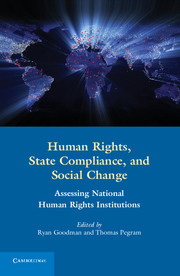10 - The Societalization of Horizontal Accountability
Rights Advocacy and the Defensor del Pueblo de la Nación in Argentina
from PART III - NHRIs and Compliance
Published online by Cambridge University Press: 05 June 2012
Summary
Introduction
The democratic period that Argentina embarked upon in 1983 is characterized by a new form of relationship between citizens and politicians that sets it apart from earlier democratic experiences. Perhaps the best-known novelty is the emergence of a more sophisticated and demanding citizenry intent on redefining preexisting ideals of democratic representation and molding them into a new civic concern for governmental accountability. The dramatic experience of state terrorism under the last military dictatorship that governed the country (1976–1983) has given rise to a new actor, the human rights movement, which has played a crucial pedagogic role within Argentine society, introducing a profound concern for rights and the rule of law into the political culture.
As a result, a new agenda of institutional reform has taken hold in Argentine society, one that demands the strengthening of agencies of accountability over state authorities and a more balanced relationship between the executive, the legislature, and judiciary. The Alfonsín administration that oversaw Argentina’s transition to democracy placed human rights at the center of its political agenda. Actions included creating an executive-appointed national human rights commission (CONADEP), which collected information about the innumerable acts of human rights violation committed by the military dictatorship, promoted the ratification of international human rights treaties, and helped bring about the historic trial of the military juntas and the eventual conviction of five of the leading members of the dictatorship. During the presidency of Carlos Saul Menem, the 1994 constitutional reform granted constitutional status to all human rights treaties and expanded the catalogue of rights. New accountability agencies were also created such as the national human rights institution (NHRI) – or Defensor del Pueblo de la Nación – and the Anticorruption Office to complement and enhance the activities of existing mechanisms of accountability.
- Type
- Chapter
- Information
- Human Rights, State Compliance, and Social ChangeAssessing National Human Rights Institutions, pp. 243 - 269Publisher: Cambridge University PressPrint publication year: 2011
References
- 3
- Cited by



